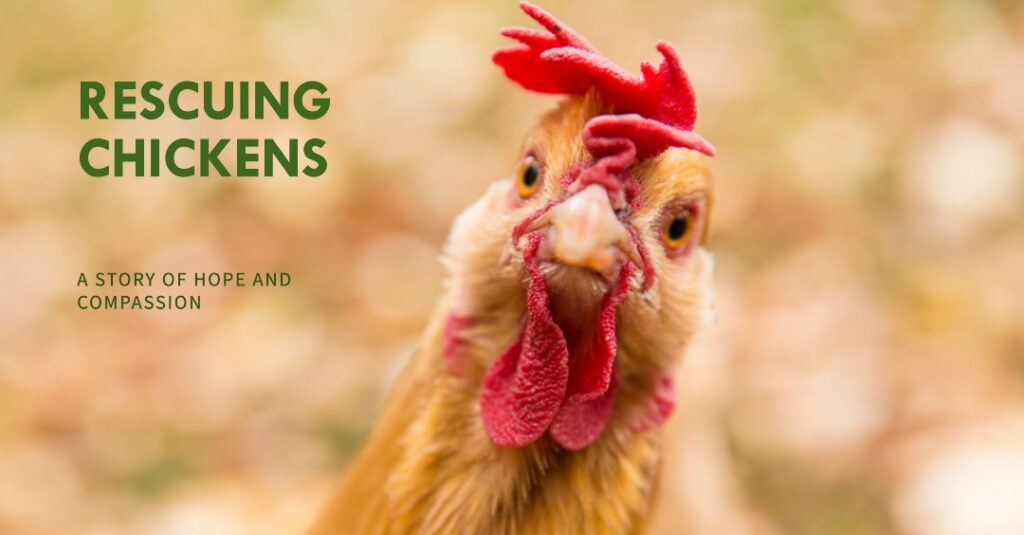Releasing rescued animals on your homestead is an incredibly heartwarming experience. Observing rescue chickens as they explore their new home is particularly delightful. However, knowing where to find rescue chickens is essential before you can enjoy this sight.
A study by the USDA in 2013 predicted that by 2019, 13 million people, or 5% of Americans, would raise chickens in their backyards[1]. Who knows what the number is now?
Two years ago, browsing social media, I stumbled upon a post about a local farm looking for homes for rescue chickens. My heart swelled with compassion, and I immediately knew I had to do something.
I contacted the farm and spoke to a kind lady named Ellen, who told me more about these rescue chickens. They were older hens who had lived their lives in a commercial egg-laying facility. Due to their age, they were no longer as productive, and the farm was looking for loving homes where they could live out the rest of their days in peace.
Ellen shared her knowledge and expertise about caring for chickens with me as we talked. She explained the importance of providing a safe and comfortable space for them to live in and the proper nutrition they needed to stay healthy. I took notes and asked questions, eager to learn as much as possible.
The following week, I visited the farm to meet the chickens and pick out my new feathered friends. I was excited and nervous, knowing this would be a whole new chapter in my life. When I arrived at the farm, Ellen greeted me warmly and led me to the area where the chickens were housed. Seeing so many hens in cramped conditions tugged at my heartstrings, and I knew I had made the right decision.
I carefully selected five hens, each with a unique personality and appearance. Ellen helped me load them into the back of my pickup truck, giving me some feed and care instructions to get started. I thanked her and promised to give the chickens the best home possible.
I prepared the chicken coop I had built when I arrived home, anticipating their arrival. I filled it with fresh straw and set up nesting boxes, feeders, and waterers. As I released each chicken into its new home, I felt a sense of joy and satisfaction knowing that I was giving these wonderful creatures a second chance at a happy life.
This article will guide you through the process of rescuing chickens, discuss the costs involved, and provide advice on where to look.
Finding Chickens to Rescue
The process of finding rescue chickens may vary depending on where you acquire them. Different organizations have distinct rules and procedures, but some general advice applies to most situations. Keep the following points in mind as you begin your search for chickens:
Proof of Residence
Many chicken charities conduct checks to ensure that the adopter’s residence is suitable for housing chickens. Be prepared to provide a copy of your lease or proof of land ownership. It’s also a good idea to have photos of your farm, particularly the intended chicken coop.
Costs of Care
Organizations that support chickens want to ensure that potential adopters know the financial costs of keeping chickens. Although chickens are generally less expensive to house and feed than other animals, they may sometimes require costly medications. Rescue chickens, in particular, are more prone to health issues that can be expensive to treat. Be ready to discuss these costs when asked.
Be Open to Learning
Volunteers and staff at chicken rescue organizations are knowledgeable about the care these animals require. They will want to ensure that you understand the basics of chicken care and are open to receiving guidance and advice. Be receptive to new ideas and avoid arguing with the rescue organization. The welfare of the hens, which should also be your priority, is their primary concern.
The Cost of Rescuing Chickens
The cost of adopting a rescue chicken can vary depending on the organization. Some charities offer chickens for free, while others request a donation. The amount you may be asked to contribute can range from a few dollars to $10 per hen, depending on the level of care the charity provides before the chickens come to you. If a charity arranges transportation, vaccinations, and health checks, expect to pay more. However, the cost may be lower if the charity connects adopters with individuals looking to rehome their hens.
Where to Find Chicken Rescue Organizations and Rescued Chickens for Adoption
Registered Hen Charities
Registered hen charities are an excellent option, particularly for those new to rescuing hens. These organizations provide you with hens and offer advice on getting started. They often collaborate with local farms and other rescue groups to find large groups of hens needing adoption. Becoming involved with a hen rescue organization is a wonderful way to support nature’s incredible providers.
Online Searches and Social Media
To locate a local chicken rescue organization, search online or ask for recommendations on social media. Most chicken charities in the US focus on specific geographic areas. Transporting chickens over long distances can be logistically challenging and stressful for the animals, so few organizations operate nationally. Online chicken rescue groups on Facebook may also be a helpful source of information and recommendations.
Online Forums
The growing popularity of homesteading has led to numerous online groups for chicken enthusiasts. You can search for ads for rescue hens in these groups or post a request asking if anyone knows of hens in need of rescue. You may be surprised at how many people want to reduce their flock size or rehome some chickens.
Website Forums
Forums on websites like Craigslist (if you’re in the US) or other niche forums for hens can be a good source of rescue chickens. Be cautious of potential scams when using websites like these – research the person posting the ad. Requesting a photo ID can help you differentiate between genuine rehomers and scammers. When meeting someone you don’t know to acquire hens, always bring a friend along for safety.
Poultry Farms
Many chicken farms have adopted more humane practices for dealing with hens nearing the end of their laying careers, thanks to increasing public awareness about the mass culling of healthy animals. These farms may host rehoming events throughout the year, sometimes even promoting them on social media or their websites. Keep an eye out for such opportunities.
Bird and Animal Sanctuaries
Animal shelters are another option to explore if you’re considering keeping chickens as pets and are not overly concerned about egg production. Some shelters provide homes to older birds that may lay infrequently or not at all. While these birds may not produce as many eggs, they can still be valuable additions to your homestead, offering pest control, fertilizing empty lots for future planting, and serving as natural waste processors. Additionally, chickens make wonderful pets.
Rehoming Your Chickens
Contact a local chicken rescue organization for guidance if you need to find a new home for your flock. There are many reasons why people must rehome their hens, and rescue organization staff will not judge you for seeking their help. They appreciate responsible rehoming efforts and can provide expert advice to ensure the well-being of the chickens. It’s always best to consult with professionals, as many chickens are abandoned or mistreated otherwise.





